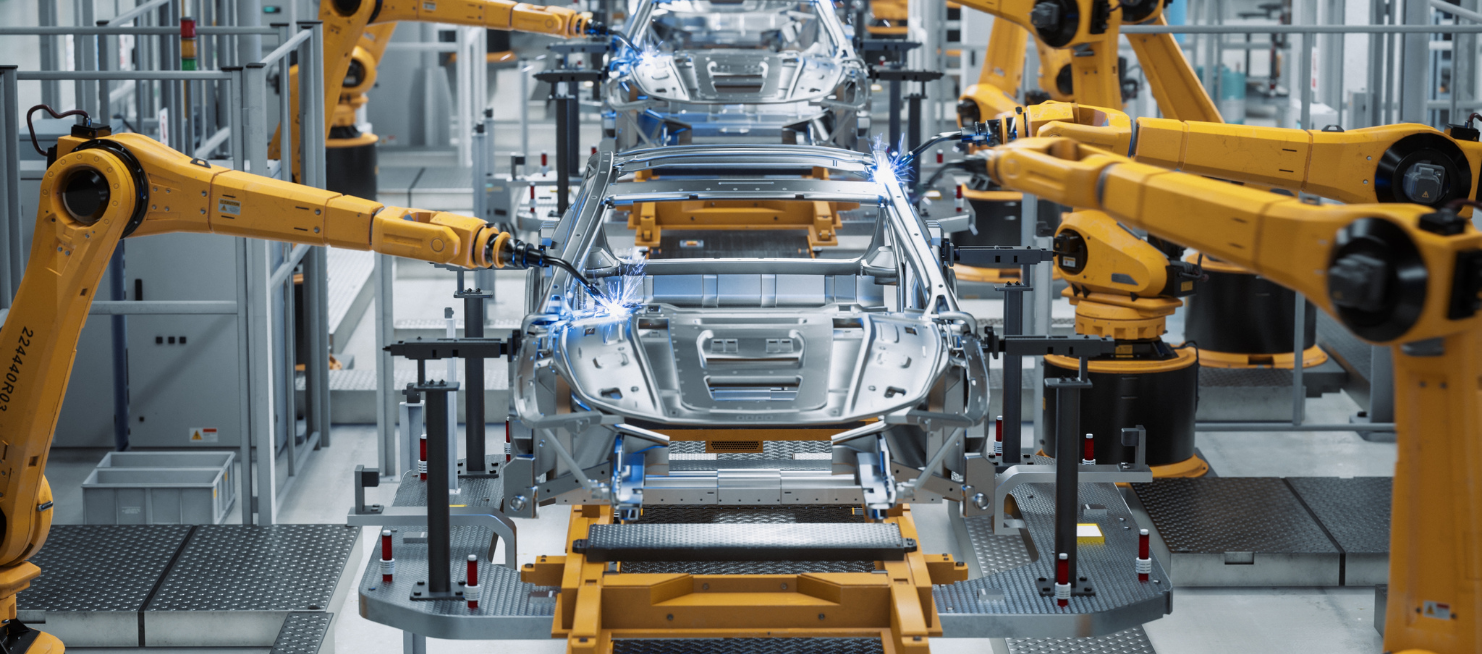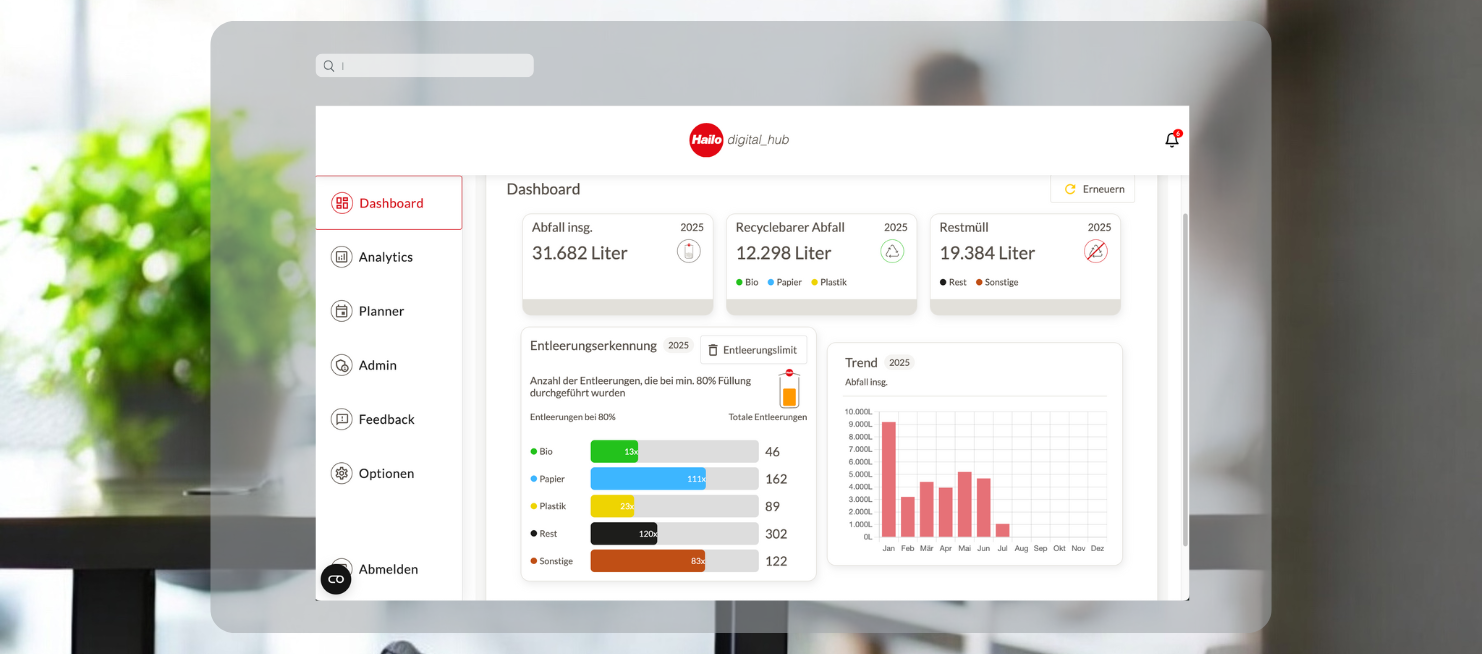Smart Waste in Manufacturing: Sustainable Waste Management for Industrial Operations

It is not just facility services industry facing challenges in waste management -manufacturing companies are under increasing pressure as well. In factories, waste is generated continuously along production lines, whether it’s packaging, offcuts, or rejected parts. Waste disposal should not disrupt operations. In fact, in a well-timed production environment, waste management should be just as efficiently orchestrated as material logistics. This is where the strengths of a digital, smart waste management system become especially apparent. IoT-based solutions can be used in industrial settings to promote sustainability, streamline operations, and reduce costs.
Key Challenges in Industrial Waste Management
Production environments come with specific requirements: large machinery setups, strict cycle times, and rigorous safety regulations. Any unplanned interruption, whether caused by overflowing waste bins or inefficient collection rounds, can increase costs. Manufacturers typically face the following issues:
- Overflowing containers: When containers for production waste have reached their capacity, they can disrupt workflows. Employees may need to stop what they are doing to clear the waste, or worse risk injury due to debris left on the floor.
- Half-empty collections: Collecting waste from containers, which are not full, wastes transport capacity and staff time - resources that could be better used for more important taks.
- Manual route planning: Without digital tools, collection routes must be planned manually. This ties up personnel resources and is time-consuming, especially on large production sites. Suboptimal planning can lead to longer distances, more fuel consumption, and inefficient use of equipment.
- Lack of data transparency: When waste data is missing or not collected, opportunities for improvement go unnoticed. Valuable recyclables may end up in general waste because there is no oversight of what is actually being disposed of.
How Digital Waste Management Works on the Factory Floor
Just as in office environments, sensor technology and data analytics are key. Smart fill-level sensors inside waste containers reporting fill-levels in real-time. With that, facility managers oder production managers get a real-time overview of all containers across the plant.
When combined with a digital facility map, this enables dynamic route planning. Unnecessary trips are avoided. Instead, collections are consolidated and carried out precisely when needed.
One of the biggest advantages in industrial settings is the seamless integration into existing workflows. Waste removal can be timed to coincide with scheduled machine downtimes or shift changes, so that no disruption occurs. Alerts can also be configured: for instance, if a critical container nears capacity, the system notifies the responsible team to take action before it becomes a problem.
The result: greater container availability, cleaner and safer work environments, and optimized coordination between cleaning, logistics, and production teams.
Supporting ESG Goals and Regulatory Compliance
Manufacturers often operate under close scrutiny when it comes to environmental standards and sustainability regarding to ISO 14001, circular economy legislation, or customer-driven ESG requirements.
Smart waste systems support these goals in two important ways:
- Improved recycling and reduced residual waste through transparency in waste streams.
- Accurate data for environmental and ESG reporting, for example:
- How much production waste was recycled
- How waste volumes are trending over time
- How efficient collection routes are
This kind of sustainability data is increasingly in demand - by regulators, customers, and business partners alike. Smart solutions automatically prepare these metrics, making ESG reporting significantly easier h16b.com.
Economic Benefits for Manufacturing Operations
Besides environmental terms, the business case is compelling: digital waste management reduces costs associated with collection and disposal.
Efficiency gains impact on the entire production process: fewer interruptions, fewer unnecessary collections, and better use of labor and equipment. This translates into less downtime and lower fuel consumption, both of which contribute to significantly reduced waste handling costs.
Some companies report savings of up to 20% on disposal costs, including lower wear on forklifts and fewer overtime hours for waste-related tasks. Part of these savings can be reinvested - into improved recycling infrastructure or employee training for better waste separation - creating a positive cycle of sustainability within the production environment.
Imagine an automotive supplier implementing Smart Waste sensors on their production floor. In the past, overflowing waste containers caused disruptions and delays. Now, sensors alert the team before problems arise.
Data analysis reveals that some waste bins were being emptied when they were only 30% full. With this insight, the emptying schedule is adjusted, saving hours of labor every year. As a result, processes run more smoothly, and the waste management team becomes more productive, able to focus on sorting recyclable materials rather than driving around aimlessly checking bins.
This scenario clearly demonstrates how digital waste management not only cuts costs but also optimizes operational workflows, contributing directly to competitiveness.
Smart Waste Unlocks Value in Industrial Settings
Smart Waste Solutions unleash their full potential in manufacturing environments. They combine the pursuit of sustainability with the demands of efficient, uninterrupted production. With automated, data-driven waste management, manufacturers can preserve resources, reduce costs, and deliver on ESG commitments. In short: exactly what modern production sites need.










